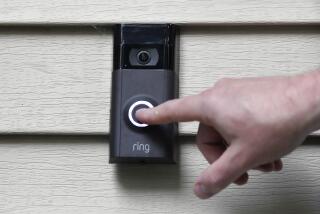AOL Drops Plans to Sell Members’ Phone Numbers
- Share via
The clash of computer online access, commercialism and privacy forced America Online on Thursday to retreat from a nascent plan to make the phone numbers of its 8.3 million members available to other firms for telemarketing purposes.
Although junk mail and telemarketing calls have become commonplace, customers felt America Online’s plan was a particularly egregious breach of their privacy. Although AOL has made other information about members available to marketers in the past, it has never released anything as personal as a telephone number.
For the record:
12:00 a.m. July 26, 1997 For the Record
Los Angeles Times Saturday July 26, 1997 Home Edition Part A Page 4 Foreign Desk 1 inches; 33 words Type of Material: Correction
Lexis-Nexis--A story on America Online in Friday’s editions incorrectly stated that Lexis-Nexis’ P-Trak service made Social Security numbers available on the World Wide Web. The numbers were available only on a commercial database.
The plan also struck a nerve because computer networks traditionally provide--and in some cases thrive on--a veil of anonymity. One of the most popular activities on AOL is to don a fictitious name, and sometimes personality, and strike up online conversations.
AOL, the world’s largest commercial online service, quietly changed its online Terms of Service contract to accommodate the sharing of subscriber phone numbers with its marketing partners. Although it is common for companies to sell the names and addresses of customers, the practice of releasing phone numbers is relatively rare, analysts said.
AOL members were angered not only by the policy, which was scheduled to take effect July 31, but also by AOL’s failure to notify them of the change.
AOL’s proposal reinforced fears that privacy rights are steadily eroding in cyberspace. Mounting public concern helped spur the Federal Trade Commission to hold hearings in Washington last month to examine whether government regulation is needed. President Clinton recently announced that he would give the online industry a chance to prove it can regulate itself.
But America Online’s flirtation with making customers’ phone numbers available to outsiders prompted some observers to question whether the Dulles, Va., company--and others--can practice reasonable self-restraint.
Privacy watchdogs are also troubled by AOL’s failure to publicize the new policy so that members could remove their numbers from the telemarketing lists.
“Obviously, AOL didn’t make the best decision,” said Deirdre Mulligan, staff council at the Center for Democracy and Technology, a civil liberties organization in Washington.
In a “Dear Member” letter sent to customers Thursday, AOL Chief Executive Steve Case acknowledged that he could have done a better job alerting them that their phone numbers would soon be shared with outsiders and explaining the company’s rationale for doing so. “Obviously, by not being more proactive, we’ve generated a lot of confusion and concern,” he said.
Half of all people online are AOL customers, and therefore the company is often the first to test the boundaries of consumer expectations in cyberspace. Like other online operators, AOL has found that customers expect the online world to be more pristine than the physical world, with a higher degree of reliability and privacy.
But America Online is looking for ways to make money beyond the monthly fees it charges for its online content and access to the Internet global computer network. Investors have praised AOL’s efforts to make its customers--a relatively wealthy demographic--available to advertisers.
But AOL’s efforts to boost revenue by attracting subscribers and advertisers have backfired in the past. Network capacity problems dragged on for months, subjecting some customers to relentless busy signals that shut them out of the service. AOL spent several hundred million dollars upgrading its network after 37 state attorneys general threatened to file lawsuits alleging consumer fraud.
Members also complained about an onslaught of unwanted electronic mail messages, selling a range of services from computer software to pornography.
For AOL member Sue Chant, a writer with an unlisted phone number who lives in Santa Monica, the aborted telemarketing plan was the last straw.
“When I go online, I’m immediately inundated with ads, my e-mail box is full of junk mail every day, and now they want to make it worse with personal phone calls,” said Chant, who plans to cancel her AOL service. “It’s just too much. They’re taking advantage of us.”
The company could end up losing tens of thousands of customers like Chant, said Kate Delhagen, a senior analyst with Forrester Research in Cambridge, Mass.
The episode was reminiscent of recent efforts by Lexis-Nexis and the Social Security Administration to make Social Security numbers easily available over the World Wide Web, the consumer-oriented portion of the Internet. Protestations from privacy advocates forced both organizations to restrict access to those databases.
People’s sense of privacy includes “the right to control how information about you is used after you give it to others,” Mulligan said. “There’s a difference between information about you being given to someone you have no relationship with and have no reason to trust, and AOL using that information internally,” even for telemarketing.
AOL officials said the company intended to give the phone numbers only to Tel-Save Holdings, a long-distance company, and CUC International, which sells membership in discount buying clubs. But many AOL members presumed their numbers would be circulated widely among telemarketing firms.
Although Case’s letter made it clear that he changed his mind about sharing phone numbers with Tel-Save and CUC, he left open the possibility that AOL employees could still call members to pitch their services. The company has conducted its own telemarketing activities since 1995.
CUC spokeswoman Laura Hamilton said AOL’s decision would not adversely affect its three-year, $50-million deal to promote its services because “our services will still be telemarketed to AOL subscribers.”
But that could blunt the conciliatory effect of Case’s mea culpa.
“They didn’t solve the problem,” added Forrester’s Delhagen. “My phone is still going to ring at dinner at night, and it’s something I didn’t ask for.”
America Online stock lost $1.75 in trading on the New York Stock Exchange on Thursday and closed at $65.25 a share.







